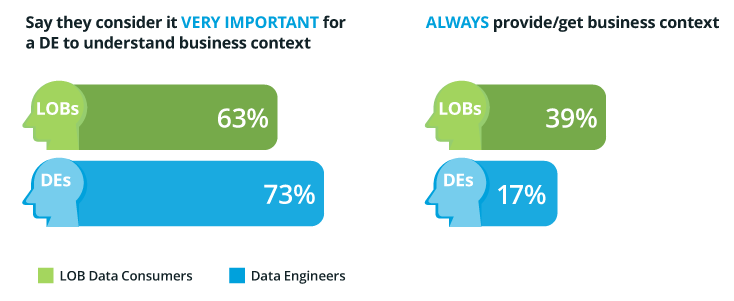Change is brewing in the data world. Where once teams were focused on securing data at all costs, today, there’s pressure to impact the bottom line. Right now, that pressure falls primarily on data leaders. But before long, it’ll touch every member of the data team.
To help our big community of data engineers get ahead of the game, we decided to dig into the subject. We surveyed over 500 data engineers and 750 business users across various industries to uncover insights into data engineering’s current impact.
The results reveal an opportunity for companies to get more value from data engineering. While fundamental in analytics and decision-making, many companies treat data engineering primarily as an operational function. However, when data engineers have proper context and collaborate closely with business teams, they can provide tremendous strategic value.
Here’s a deeper look at what we found and what companies can do to unleash data engineering’s full potential.
The Perception Challenge
Our research found that while most business data consumers see data engineering as important, only 32% view it as critical to their work. However, the survey showed that those who do find it critical get better results — higher-quality data delivered faster.
The Need for True Collaboration
Another clear finding is that most data engineers want to collaborate more with business units and function as strategic partners. But the business side has yet to buy into that model fully.
55% of data engineers aim to be true strategic partners, but only 32% of business users are ready for that kind of relationship. The majority still see data engineers as task-oriented.
This misalignment means data engineers often lack the full business context about data requests. As a result, they miss out on optimizing data solutions to meet strategic goals.
Connecting Data Work to Business Context and Impact
Our research makes it clear that data engineers excel when they understand the business context and desired impact behind requests. But currently, less than 20% say they always get this high-level perspective from business users.

When data engineers have this line of sight into strategic goals like improving customer retention or increasing sales, survey results show they provide better solutions. They can also measure their success more meaningfully.
However, 60% of data engineers don’t track their impact on external strategic goals at all currently focusing primarily on tactical metrics like tickets closed and internal strategic goals like operational efficiency. Tighter alignment with business objectives is needed.
The Path Forward
The data engineers we surveyed are largely satisfied with their careers so far. But 29% believe their organizations aren’t leveraging data engineering to its full potential. They cite a lack of cross-team communication and formal processes as top roadblocks.
Our research reveals an immense opportunity for companies to empower data engineers and drive more strategic value from their work. By educating business teams, implementing consistent data request processes, and more, organizations can begin to realize the truly tremendous potential of their data engineering teams.
Get all the findings and recommendations when you download your full copy of the report here.
At StreamSets, our goal is to provide technology that makes data engineers wildly productive so they can spend less time on tedious pipeline work and more time delivering high-value data solutions. Learn more about our modern data integration platform.
The post The Untapped Potential of Data Engineers appeared first on StreamSets.


